4 Инсталација Windows агента из MSI-ја
Преглед
Zabbix агент се може инсталирати на Windows-у помоћу 32-битних или 64-битних MSI инсталационих пакета, доступних за преузимање.
Минимални OS захтеви за MSI инсталацију су:
- За Zabbix агента: Windows XP (64-битни) или Windows Server 2003
- За Zabbix агента 2: Windows 10 (32-bit) или Windows Server 2016
32-битни пакети се не могу инсталирати на 64-битне системе.
Пакети укључују:
- TLS подршку (TLS конфигурација је опциона)
- Zabbix get and Zabbix sender услужни програми (могу се инсталирати заједно са Zabbix агентом/агентом 2 или засебно)
Zabbix агент 2 пакети не укључују додатке који се могу учитати (MongoDB, PostgreSQL, MSSQL), које треба [преузети и инсталирати] (#zabbix-agent-2-loadable-plugins) одвојено.
Инсталирање се може обавити помоћу Чаробњака за подешавање или командне линије.
Иако је инсталација помоћу MSI пакета у потпуности подржана, препоручује се инсталирање најмање Microsoft .NET Framework 2 за правилно руковање грешкама.
Препоручује се коришћење подразумеване локације за инсталирање коју је обезбедио инсталер. Коришћење прилагођене локације без неопходних дозвола може да угрози безбедност инсталирања.
Инсталирање преко Setup Wizard-а
Следећи кораци инсталације примењују се и на Zabbix агента и на Zabbix агента 2.
1. Двапут кликните на преузету MSI датотеку да бисте започели инсталацију:

2. Прихватите Уговор о лиценцирању крајњег корисника:
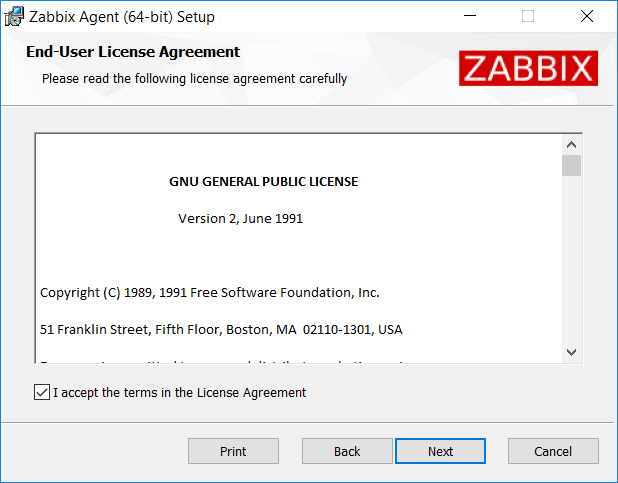
3. Изаберите Zabbix компоненте (Агент демон, Zabbix sender, Zabbix get) које желите да инсталирате:
Препоручује се коришћење подразумеване локације за инсталирање коју је дао инсталер. Коришћење прилагођене локације без потребних дозвола може угрозити безбедност инсталације.

4. Конфигуришите следеће параметре. Њихове вредности ће бити постављене у конфигурационој датотеци Zabbix агента:
| Parameter | Description |
|---|---|
| Host name | Име домаћина машине на којој се инсталира Zabbix агент. Поставља параметар Hostname. |
| Zabbix server IP/DNS | Листа IP адреса раздвојених зарезима, опционо у CIDR нотацији, или DNS имена Zabbix сервера или Zabbix проксија. Овај параметар је обавезан. Поставља параметар Сервер. |
| Agent listen port | Агент ће слушати на овом порту за везе са сервера. Поставља параметар ListenPort. |
| Сервер или прокси за активне провере | Zabbix сервер/прокси адреса или конфигурација кластера за добијање активних провера. Адреса сервера/проксија је IP адреса или DNS име и опциони порт одвојени двотачком. Поставља параметар ServerActive. |
| Enable PSK | Означите поље за потврду да бисте омогућили подршку за ТЛС користећи унапред дељене кључеве. Поставља параметре TLSConnect и TLSAccept на psk. |
| Add agent location to the PATH | Означите поље за потврду да бисте додали локацију Zabbix агента у системску PATH променљиву. |
Ако се открије постојећи Zabbix агент, биће приказане вредности параметара из његове конфигурационе датотеке. Поред тога, постојећа конфигурациона датотека ће бити преименована током инсталације и креираће се нова конфигурациона датотека.
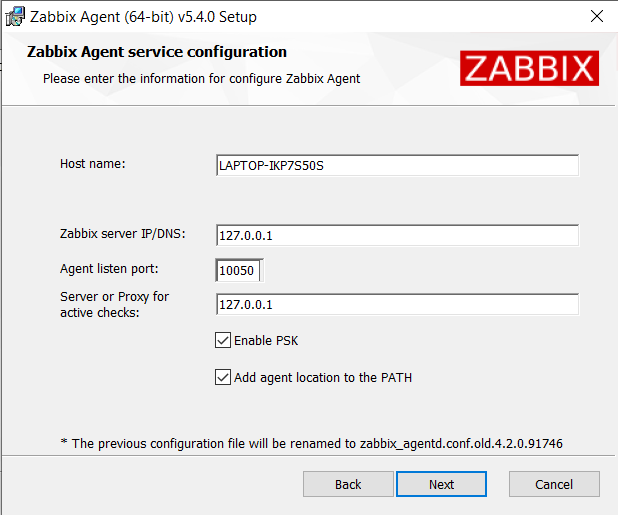
5. Конфигуришите PSK параметре ако сте у претходном кораку означили поље за потврду Омогући PSK. Ови параметри ће такође бити постављени у конфигурационој датотеци Zabbix агента:
| Parameter | Description |
|---|---|
| Pre-shared key identity | Стринг идентитета унапред дељеног кључа. Поставља параметар TLSPSKIdentity. |
| Pre-shared key value | Вредност стринга унапред дељеног кључа. Креира датотеку psk.key која садржи кључ и поставља параметар TLSPSKFile на локацију кључа (подразумевано: C:\Program Files\Zabbix Agent\psk.key). Препоручује се да ограничите приступ унапред дељеној кључној датотеци прилагођавањем безбедносних поставки датотеке тако да само Zabbix агент (или корисник који покреће агентa) може да је чита. |
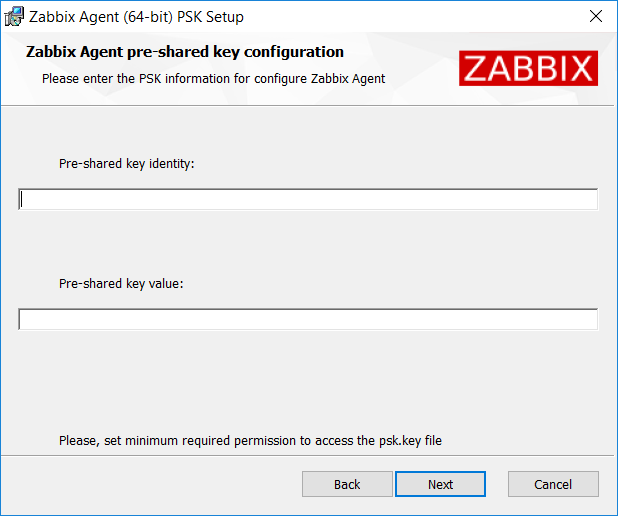
6. Кликните на Инсталирај да бисте започели инсталацију.
Све изабране Zabbix компоненте и конфигурациона датотека Zabbix агента биће инсталиране на вашу наведену локацију (подразумевано: C:\Program Files\Zabbix Agent). Исто важи и за Zabbix агентa 2, осим што ће додатне конфигурационе датотеке за његове уграђене додатке бити инсталиране у поддиректоријуму zabbix_agent2.d\plugins.d.
Поред тога, zabbix_agentd.exe (или zabbix_agent2.exe) ће бити подешен као Windows сервис са одложеним аутоматским покретањем (или аутоматским покретањем на верзијама оперативног система Windows пре Windows Vista/Server 2008).
Ако је друга верзија Zabbix агента покренута током инсталације, од вас ће бити затражено да изаберете или да затворите апликацију и покушате да је поново покренете или да је оставите отвореном, у ком случају ће бити потребно поновно покретање.
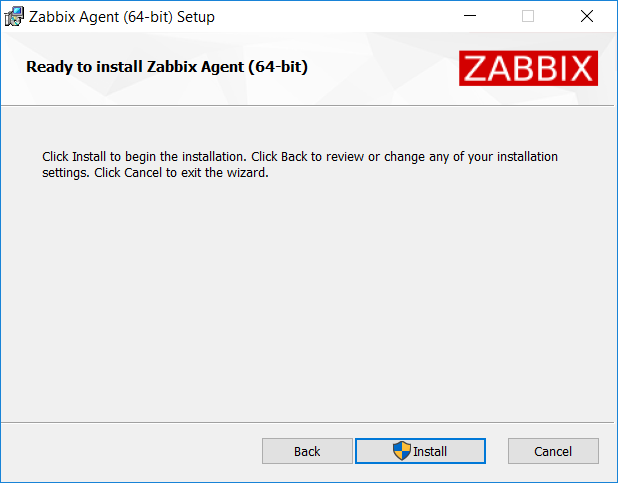
7. Кликните на дугме Заврши да бисте изашли из Чаробњака за подешавање.
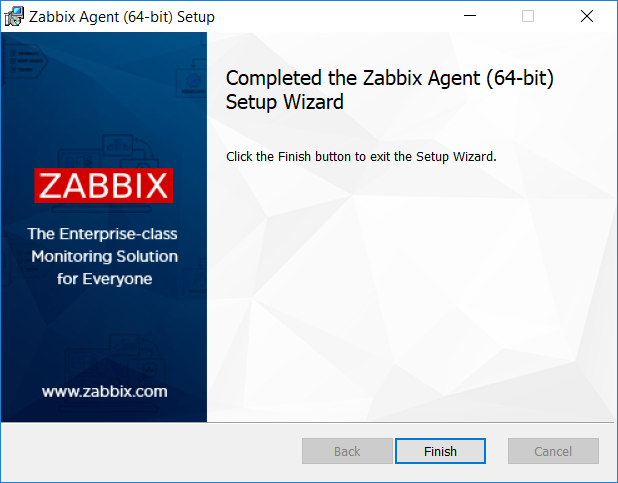
Инсталирање из командне линије
Zabbix агент се може инсталирати из командне линије покретањем MSI инсталационог програма msiexec. На пример:
msiexec.exe /l*v "C:\package.log" /i "C:\zabbix_agent-7.0.0-windows-amd64-openssl.msi" /qn+ SERVER=192.0.2.0Овај метод омогућава инсталирање без надзора и прилагођене конфигурације помоћу параметара.
Подржани параметри
Zabbix агент MSI инсталациони пакети подржавају следеће параметре за Zabbix агента и Zabbix агентa 2.
:: noteclassic Параметри за Zabbix агента/агента2 се постављају у конфигурационој датотеци током инсталације. Кликните на име параметра да бисте видели његов детаљан опис и примере конфигурације на страници Zabbix агент (Windows). За Zabbix агент 2, погледајте Zabbix агента 2 (Windows) страницу. :::
| Parameter | Description |
|---|---|
| ADDDEFAULT | Листа програма раздвојених зарезима за инсталирање у њиховој подразумеваној конфигурацији. За више информација, погледајте ADDDEFAULT својство. Могуће вредности: AgentProgram, GetProgram, SenderProgram, ALLПример: ADDDEFAULT=AgentProgram, GetProgram |
| ADDLOCAL | Листа компонената раздвојених зарезима за локално инсталирање. За више информација, погледајте ADDLOCAL својство. Могуће вредности: AgentProgram, GetProgram, SenderProgram, ALL.Пример: ADDLOCAL=AgentProgram, SenderProgram |
| ALLOWDENYKEY | Листа параметара AllowKey или DenyKey раздвојених тачком и зарезом за ограничавање провере Zabbix агента. Ако је потребно, користите обрнуту косу црту да бисте избегли граничник (\;). Подешава параметре AllowKey и DenyKey у конфигурационој датотеци агента.Пример: ALLOWDENYKEY="AllowKey=system.run[type C:\Windows\System32\drivers\etc\hosts];DenyKey=system.run[*]" |
| CONF | Комплетна путања до прилагођене конфигурационе датотеке за Zabbix агента. Током инсталације, ова датотека ће у потпуности заменити садржај нове или постојеће конфигурационе датотеке агента. Датотека мора да садржи најмање параметре Сервер и LogFile. Пример: CONF="C:\full\path\to\example.conf" |
| ENABLEPATH | Користити ENABLEPATH=1 да додате локацију Zabbix агента у системску променљиву PATH. |
| ENABLEPERSISTENTBUFFER | Само Zabbix агент 2. Омогућава коришћење локалног трајног складишта за активне ставке. |
| HOSTINTERFACE | Опциони параметар који дефинише интерфејс домаћина. |
| HOSTMETADATA | Опциони параметар који дефинише метаподатке домаћина. |
| HOSTMETADATAITEM | Опциони параметар који дефинише ставку која се користи за добијање метаподатака домаћина. |
| HOSTNAME | Опциони параметар који дефинише име домаћина. |
| INCLUDE | Листа појединачних датотека раздвојених тачком и зарезом или свих датотека у директоријуму које треба укључити у конфигурациону датотеку Zabbix агента. |
| INSTALLFOLDER | Комплетна путања до директоријума у ком ће Zabbix компоненте заједно са конфигурационом датотеком Zabbix агента бити инсталиране. За Zabbix агента 2, додатне конфигурационе датотеке за уграђене додатке биће инсталиране у поддиректоријум zabbix_agent2.d\plugins.d.Пример: INSTALLFOLDER="C:\Program Files\Zabbix Agent" |
| LISTENIP | Листа IP адреса раздвојених зарезима које агент треба да слуша. |
|LISTENPORT|Агент ће на овом порту слушати везе са сервера.|
|LOGFILE|Име Zabbix агент лог датотеке.| |LOGTYPE|Тип излаза лог датотеке.| |NONMSICONFNAME|Комплетна путања до прилагођене конфигурационе датотеке за Zabbix агента. Током инсталације, сви важећи конфигурациони параметри агента присутни у овој датотеци (ограничени на оне наведене у овој табели) ће заменити одговарајуће параметре у новој или постојећој конфигурационој датотеци агента. Датотека мора да садржи најмање параметар Сервер.
Пример: NONMSICONFNAME="C:\full\path\to\example.conf"| |PERSISTENTBUFFERFILE|Само Zabbix агент 2. Датотека у којој Zabbix агент 2 треба да чува SQLite базу података.| |PERSISTENTBUFFERPERIOD|Само Zabbix агент 2. Временски период за који подаци треба да се чувају када нема везе са сервером или проксијем.| |SERVER|Листа IP адреса раздвојених зарезима, опционо у CIDR нотацији, или DNS имена Zabbix сервера и Zabbix проксија. Овај параметар је обавезан.| |SERVERACTIVE|Zabbix сервер/прокси адреса или конфигурација кластера за добијање активних провера.| | SKIP |КористиSKIP=fw да спречи MSI инсталера да дода правило изузетка Windows заштитног зида за Zabbix агента.| | STARTUPTYPE |Тип покретања Zabbix агента сервиса. Могуће вредности:
аутоматски - аутоматски покрените услугу при покретању Windows-а;
одложено - (подразумевано) одлагање покретања сервиса након што се аутоматски покренути сервиси доврше (доступно на Windows Vista/Server 2008 и новијим верзијама);
ручно - покрените сервис ручно (од стране корисника или апликације);
онемогућено - онемогућите сервис тако да је не може покренути корисник или апликација.
Пример: STARTUPTYPE=disabled| |STATUSPORT|Само Zabbix агент 2. Ако је подешено, агент ће на овом порту слушати HTTP статусне захтеве (http://localhost:<port>/status).| |TIMEOUT|Одређује колико дуго треба чекати (у секундама) за успостављање конекције и размену података са Zabbix проксијем или сервером.| |TLSACCEPT|Долазне везе за прихватање (користи се за пасивне провере). Ако је подешено на psk, онда ће TLSCONNECT такође бити постављен на psk (осим ако није другачије наведено).| |TLSCAFILE|Пуно име путање датотеке која садржи CA(s) сертификате највишег нивоа за верификацију сертификата.| |TLSCERTFILE|Комплетна путања датотеке која садржи сертификат агента или ланац сертификата.| |TLSCONNECT|Како агент треба да се повеже са Zabbix сервером или проксијем (користи се за активне провере). Ако је подешено на psk, онда ће TLSACCEPT такође бити постављен на psk (осим ако није другачије наведено).| |TLSCRLFILE|Комплетна путања датотеке која садржи опозване сертификате.| |TLSKEYFILE|Комплетна путања датотеке која садржи Zabbix приватни кључ.|
|TLSPSKFILE|Комплетна путања датотеке која садржи унапред дељени кључ Zabbix агента. Ако су постављени и TLSPSKFILE и TLSPSKVALUE, вредност TLSPSKVALUE ће бити записана у датотеку наведену у TLSPSKFILE. Препоручује се да ограничите приступ унапред дељеној кључној датотеци прилагођавањем безбедносних поставки датотеке тако да само Zabbix агент (или корисник који покреће агент) може да је чита.| |TLSPSKIDENTITY|Унапред дељени кључ стринг идентитета.| | TLSPSKVALUE |Вредност стринга унапред дељеног кључа. Ако су постављени и TLSPSKFILE и TLSPSKVALUE, вредност TLSPSKVALUE ће бити уписана у датотеку наведену у TLSPSKFILE.
Пример: TLSPSKVALUE=1f87b595725ac58dd977beef14b97461a7c1045b9a1c963065002c5473194952| |TLSSERVERCERTISSUER|Издавач сертификата дозвољеног сервера (прокси).| |TLSSERVERCERTSUBJECT|Тема сертификата дозвољеног сервера (прокси).|
Примери
Следећи пример инсталира Zabbix агента са прилагођеном конфигурацијом. Такође омогућава TLS подршку користећи унапред дељене кључеве.
mkdir "C:\Program Files\Zabbix Agent" 2>nul
msiexec.exe /l*v "C:\package.log" /i "C:\zabbix_agent-7.0.0-windows-amd64-openssl.msi" /qn+^
SERVER=192.0.2.0^
INSTALLFOLDER="C:\Program Files\Zabbix Agent"^
HOSTNAME=LAPTOP-IKP7S51S^
TLSACCEPT=psk^
TLSCONNECT=psk^
TLSPSKIDENTITY="PSK 001"^
TLSPSKFILE="C:\Program Files\Zabbix Agent\psk.key"^
TLSPSKVALUE=1f87b595725ac58dd977beef14b97461a7c1045b9a1c963065002c5473194952^
ENABLEPATH=1^
ALLOWDENYKEY="AllowKey=system.run[type C:\Windows\System32\drivers\etc\hosts];DenyKey=system.run[*]"Следећи пример инсталира новију верзију Zabbix агента и користи прилагођену конфигурациону датотеку да замени одређене параметре (нпр., Hostname=LAPTOP-IKP7S51S,DESKTOP-X9F4A2B) у постојећој конфигурационој датотеци агента.
msiexec.exe /l*v "C:\package.log" /i "C:\zabbix_agent-7.0.10-windows-amd64-openssl.msi" /qn+ NONMSICONFNAME="C:\agent.conf"Zabbix агент 2 додаци који се могу учитати
Zabbix агент 2 додаци који се могу учитати се могу инсталирати на Windows-у помоћу 64-битних MSI инсталационих пакета, доступних за преузимање.
Минимални OS захтеви за MSI инсталацију су Windows 10 (64-битни) или Windows Server 2016.
Пакети укључују:
Пакети не укључују Ember+ plugin, који је тренутно доступан само за изградњу из изворног кода (и за Unix и за Windows).
Пре инсталирања додатака, проверите његову README датотеку. Може да садржи додатне захтеве и упутства за инсталацију специфичних за додатак.
Слично Zabbix агенту/агент2, додаци који се могу учитати могу се инсталирати помоћу Чаробњака за подешавање или командне линије.
Инсталирање преко Чаробњака за подешавање
1. Двапут кликните на преузету MSI датотеку да бисте започели инсталацију.
2. Прихватите Уговор о лиценцирању крајњег корисника.
3. Изаберите додатке за учитавање Zabbix агента 2 (MongoDB plugin, PostgreSQL plugin, MSSQL plugin) који треба инсталирати.
Препоручује се коришћење подразумеване локације за инсталирање коју је дао инсталер. Коришћење прилагођене локације без потребних дозвола може угрозити безбедност инсталације.
4. Кликните на Инсталирај да бисте започели инсталацију.
Сви изабрани додаци за учитавање Zabbix агента 2 биће инсталирани на вашу наведену локацију (подразумевано: C:\Program Files\Zabbix Agent 2), са њиховим конфигурационим датотекама инсталираним у поддиректоријуму zabbix_agent2.d.
5. Кликните на дугме Заврши да бисте изашли из Чаробњака за подешавање.
Инсталирање из командне линије
Zabbix агент 2 додаци који се могу учитати могу се инсталирати са командне линије покретањем MSI инсталера са msiexec. На пример:
Zabbix агент 2 додатак који се може учитати, MSI инсталациони пакети подржавају следеће параметре.
| Parameter | Description |
|---|---|
| ADDDEFAULT | Листа компоненти раздвојених зарезима за инсталирање у њиховој подразумеваној конфигурацији. За више информација погледајте ADDDEFAULT property. Могуће вредности: MongodbPlugin, PostgresqlPlugin, MssqlPlugin, ALLПример: ADDDEFAULT=MongodbPlugin,PostgresqlPlugin |
| ADDLOCAL | Листа компоненти раздвојених зарезима за локално инсталирање. За више информација погледајте ADDLOCAL property. Могуће вредности: MongodbPlugin, PostgresqlPlugin, MssqlPlugin, ALLПример: ADDLOCAL=MongodbPlugin,MssqlPlugin |
| INSTALLFOLDER | Комплетна путања до директоријума у који ће бити инсталиране Zabbix компоненте, са њиховим конфигурационим датотекама инсталираним у поддиректоријуму zabbix_agent2.d.Пример: INSTALLFOLDER="C:\Program Files\Zabbix Agent 2" |
